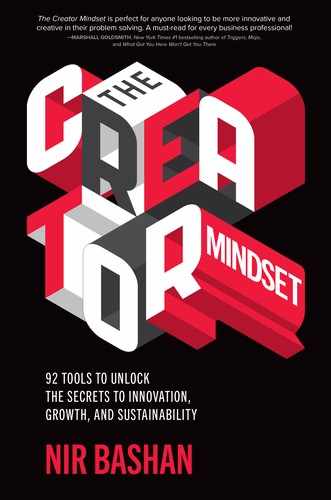CHAPTER 9

On the Virtues of Listening
A FEW YEARS AGO, I ran an advertising agency for an eccentric owner we’ll call Allen for the sake of this story. He had hired me specifically to run the agency and make sure that the company was profitable. I was given a leash as long as it could be, and it was my first time in charge. As long as revenue came in and Allen made a profit, he was happy. Allen had some very interesting quirks, including telling inappropriate stories with too much information at inappropriate times, all of which ended with him being the hero. But among all his quirks, the one that cost him the greatest amount of business was this: he talked far too much and listened far too little.
Much of our success is all about how we decide to spend and make the most of the precious resource of time. The Creator Mindset has some unique tools and skills that can be applied to time management and, of course, listening more and talking less, Both are key ingredients in allowing creativity to make a business or career far more effective—and for ensuring that you don’t become like Allen.
Here are three proven and battle-hardened Creator Mindset methods to help you approach time management in a creative way:
1. Meetings
2. Microlistening
3. Shutting up
MEETINGS
A recent study of corporate America found that 67 percent of meetings are a complete waste of time.1 Doesn’t that sound crazy? Most meetings yield no results! What can we do about this, and how can we get better at managing our time creatively? First, we need to have a point at each and every meeting. The “why” factor of a meeting is important because it provides the framing to kick-start creativity. Sometimes we cannot control the length of meetings or even their frequency, but what we can always control is our approach. First and perhaps most important, don’t be afraid to ask, “Why are we having this meeting?” It is the question in and of itself that sparks creativity as it helps the meeting become anchored in purpose. Second, if we can, we need to limit the time a meeting lasts. We cannot have meetings that drag on and on for no reason. Since most meetings yield only two or three minutes of productivity, why not limit the time of a meeting accordingly? Third, we need derivative action items: what can be done today as a result of the meeting to solve problems now. We need a takeaway from that short meeting so that all the participants know what they need to do.
This is how creativity kicks in. As we challenge the why of the meeting and then institute a limitation on its time and finally an action plan, we set up a series of events that cascade into firing up creative solutions so that problems can be solved with a fresh perspective.
MICROLISTENING
Microlistening is essentially about selective and limited listening, meaning that you gather a limited audience when you are looking for opinions, advice, and/or feedback. When it comes to microlistening, we choose to accept only a few trusted sources to learn their opinion or get their feedback or advice. Microlistening is not listening to each and every person with some opinion on this or that.
This type of listening saves both time and money. Most people think that gathering research, testing a new product or service, or gaining opinions involves extensive research that sucks up both time and money, but that is not always the case. Sometimes it takes only a small sample size to come up with a profound insight. In a rush to gain feedback, testing results, or advice about the trajectory of our careers, sometimes we listen to far too many people. We overlisten when instead we should microlisten. Focusing on a small sample size can help you determine what is working and how to move forward.
I once worked for a brilliant chief marketing officer of a Fortune 500 company. No matter how much money was spent on testing the effectiveness of the advertising, public relations, or marketing he was putting out, he had an inexpensive yardstick by which he measured the effectiveness of any new initiative. He microlistened. He would simply ask carefully selected and trusted friends and colleges their opinion, and more often than not those opinions were right. He asked a broad enough group for their opinions but did not expand it to hundreds of people. He kept it small. Then he listened. Sure, the sample size was small and analytically it’s easy to scoff at this idea, but it was brilliantly, creatively effective. Start using microlistening with trusted associates to gain valuable feedback, advice, and opinions today.
SHUTTING UP
Our urge to talk comes from a deeply seated belief that we want some vindication of our thoughts.2 It’s our egos yearning to express some point that we think is valuable. But when it is looked at creatively, something incredible begins to emerge about our urge to talk. It’s actually counterintuitive, but go with me here: the ability to be heard goes up exponentially the less you talk. Isn’t that amazing?
Basically, the less you talk and the more you think about what you want to say, the more you increase your chances of being heard. The more you shut up, the more you increase your chances of hearing something that is profound and worthwhile and incredibly valuable.
It’s a wonderful thing that you can enact today as part of your embrace of The Creator Mindset. Resist the urge to chime in thoughtlessly just to fill time and really think about what you want to say. Keep your ears open. Then measure each word with great care and don’t waste your chance to say what you mean.
The Creator Mindset looks at listening as one of the essential human traits that brought about modernity. In the past, our lives depended on listening to what people were saying to ensure survival. We needed to listen to stories about not eating this or that berry to avoid getting poisoned. We needed to listen to find out the best passage route over the mountains to avoid getting stuck in the cold of winter. We needed to listen to Harriette from Chapter 6 to discover a self-defense method to fight the beast looking to kill us. Yet something mysterious has happened over time. We have stopped listening.
The modern mind has given listening a bad name.3 We think that people have ulterior motives and that listening to them would give us a skewed view of the facts or even lies. Thus, we would succumb to some kind of manipulation just by listening to one another. Perhaps that is why we talk so much and listen so little: we are afraid of being manipulated. Therefore, we try to control the situation by talking nonstop.
But the fear of being manipulated by listening to what someone else is saying is cutting short any opportunity to learn creatively. When we listen, a host of learning can occur. From the details of the way someone views a situation all the way to the spirit of what someone is trying to say nonverbally, there are infinite lessons to be learned.
Of course, this is not to say that you should take everything someone says at face value, but the creative wealth you gain by listening far outweighs any disadvantage.
![]()
OUR ABILITY TO MANAGE our time has taken on huge significance. It is a rightful cause. Time is more valuable than anything else, and figuring out how to make the best use of it is crucial when it comes to The Creator Mindset. Time is the one thing that once gone, we can never get back. Listening more carefully and talking less can yield amazing results the first time you try it, so start listening more effectively today.
